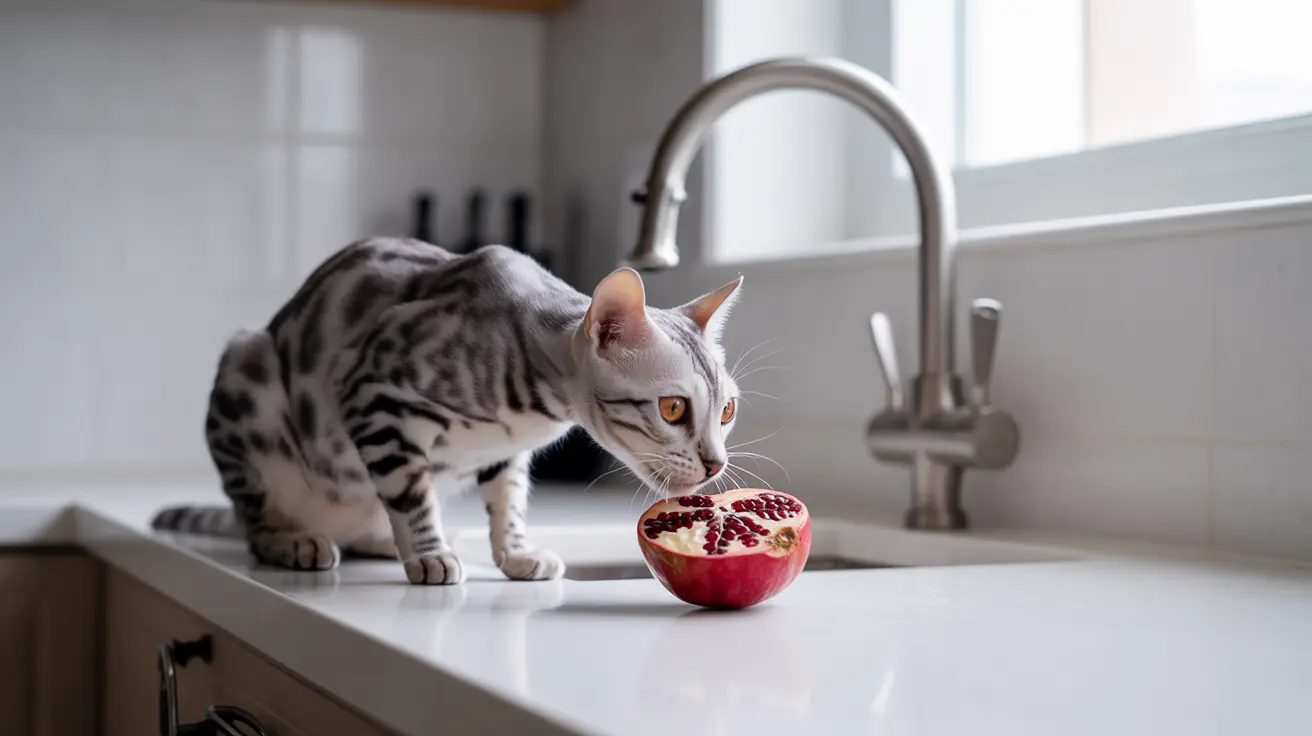Can Cats Have Pomegranate?
If you're wondering whether cats can have pomegranate, the answer is yes – but with important caveats. While pomegranates are non-toxic to cats and can be offered in tiny amounts as an occasional treat, they should never become a regular part of your feline's diet.
Understanding the proper way to serve pomegranate to cats, along with its potential benefits and risks, is crucial for keeping your pet safe and healthy. Let's explore everything you need to know about cats and pomegranate consumption.
Safety and Nutritional Benefits of Pomegranate for Cats
Pomegranates contain several beneficial compounds, including antioxidants, vitamins, and minerals. The fruit offers vitamin K for blood clotting, potassium for muscle function, and fiber for digestive health. However, cats as obligate carnivores have limited ability to process and benefit from fruit-based nutrients.
The antioxidants in pomegranate, including punicalagins and anthocyanins, can help combat free radicals in the body. Yet, these benefits are minimal compared to the nutritional value cats receive from their regular meat-based diet.
Potential Risks and Concerns
Digestive Issues
Cats may experience gastrointestinal upset when consuming pomegranate due to their sensitive digestive systems. Common symptoms can include vomiting, diarrhea, or stomach discomfort. The fruit's natural acids and tannins can be particularly problematic for some cats.
Physical Hazards
Pomegranate seeds pose a potential choking risk, especially for smaller cats or those who tend to gulp their food. The seeds can also cause intestinal blockages if consumed in large quantities.
Sugar Content
With approximately 14 grams of sugar per 100 grams, pomegranates contain more sugar than cats should regularly consume. Excess sugar intake can lead to obesity and dental problems in cats.
Safe Feeding Guidelines
Proper Preparation
If you choose to offer pomegranate to your cat, follow these essential steps:
- Remove all white membrane and peel
- Separate individual arils carefully
- Offer only one or two seeds at first
- Monitor your cat for any adverse reactions
Frequency and Portion Size
Pomegranate should be treated as an occasional treat only. Limit portions to 1-2 arils per serving, no more than once or twice a month. Always introduce new foods gradually and watch for any signs of digestive upset or allergic reactions.
Alternative Healthy Treats
Instead of pomegranate, consider these cat-appropriate treats:
- Small pieces of cooked, plain chicken
- Commercial cat treats formulated for feline nutrition
- Tiny bits of cooked fish (without bones)
- Cat grass for added fiber
Frequently Asked Questions
Can cats have pomegranate seeds without choking hazards?
While cats can technically eat pomegranate seeds, they pose a potential choking risk. Always supervise your cat and offer only one seed at a time to minimize this danger.
How often can I safely give my cat pomegranate as a treat?
Pomegranate should be limited to once or twice a month, offering only 1-2 arils per serving. This helps prevent digestive issues and maintains proper nutritional balance.
What are the health benefits of pomegranate for cats, and are they substantial?
While pomegranates contain antioxidants and vitamins, the benefits for cats are minimal. Cats get their essential nutrients from meat-based proteins, making pomegranate's nutritional contribution relatively insignificant.
How do I prepare pomegranate for cats to ensure it's safe to eat?
Remove all peel and white membrane, carefully separate individual arils, and offer just one or two seeds. Ensure the seeds are clean and fresh before feeding.
Can pomegranate cause allergic reactions in cats, and how should I monitor for signs?
Yes, cats can develop allergic reactions to pomegranate. Watch for symptoms like itching, swelling, digestive upset, or changes in behavior. If you notice any concerning signs, discontinue feeding and consult your veterinarian.
Remember, while pomegranate isn't toxic to cats, it's not a necessary part of their diet. Focus on providing your cat with a high-quality, meat-based diet that meets all their nutritional needs, and save fruits like pomegranate for very occasional treats only.






